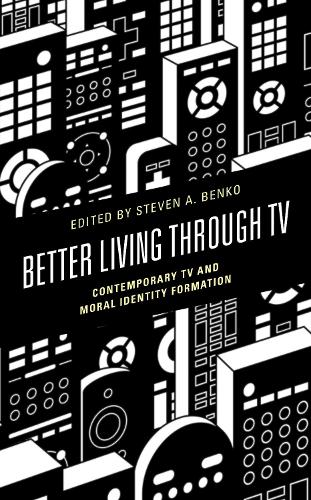
Better Living through TV: Contemporary TV and Moral Identity Formation
(Hardback)
Publishing Details
Better Living through TV: Contemporary TV and Moral Identity Formation
By (Author) Steven A. Benko
Contributions by Steven A. Benko
Contributions by Jill B. Delston
Contributions by John Hillman
Contributions by Douglas L. Howard
Contributions by Matt Hummel
Contributions by Alisa Johnson
Contributions by Eleanor Jones
Contributions by Dutton Kearney
Contributions by Leigh Kellmann Kolb
Bloomsbury Publishing PLC
Lexington Books
25th March 2022
United States
Classifications
Professional and Scholarly
Non Fiction
Media studies
Gender studies: women and girls
302.2345
Winner of Outstanding Academic Title 2023
Physical Properties
Hardback
352
Width 161mm, Height 228mm, Spine 32mm
703g
Description
Watching television need not be a passive activity or simply for entertainment purposes. Television can be the site of important identity work and moral reflection. Audiences can learn about themselves, what matters to them, and how to relate to others by thinking about the implicit and explicit moral messages in the shows they watch. Better Living through TV: Contemporary TV and Moral Identity Formation analyzes the possibility of identifying and adopting moral values from television shows that aired during the latest Golden Era of television and Peak TV. The diversity of shows and approaches to moral becoming demonstrate how television during these eras took advantage of new technologies to become more film-like in both production quality and content. The increased depth of characterization and explosion of content across streaming and broadcast channels gave viewers a diversity of worlds and moral values to explore. The possibility of finding a moral in the stories told on popular shows such as The Sopranos, Breaking Bad, The Wire, and The Good Place, as well as lesser known shows such as Letterkenny and The Unicorn, are explored in a way that centers television viewing as a site for moral identity formation.
Reviews
This fine collection of essays captures exactly why television in its Golden Age is so ripe for fruitful ethical analysis. A great feature of this book is that it finds compelling and enduring philosophy in so many different programs. In other words, it's not just for members of particular fandoms. It has real appeal for a variety of fandoms, as well as for philosophers. This book is a welcome addition to the growing field of philosophy and pop culture.
--Richard Greene, Weber State University, editor of The Sopranos and Philosophy and Dexter and PhilosophyThis series of essays, written by various contributors, scrutinizes an assortment of television series ranging from the prestigious, such as The Sopranos, Breaking Bad, and The Wire, to "lighter" fare, such as Letterkenny and The Unicorn, through a philosophical lens. The moral framework applied to each series is well researched, making this collection a sound addition to courses across disciplines from philosophy to media and film studies. The popularity of several of these series, coupled with some authors' (likely) divisive conclusions, will ensure lively student discussions in class and on the page. Highly recommended. Advanced undergraduates through faculty.
-- "Choice Reviews"Author Bio
Steven A. Benko is a professor of religious and ethical studies at Meredith College.
